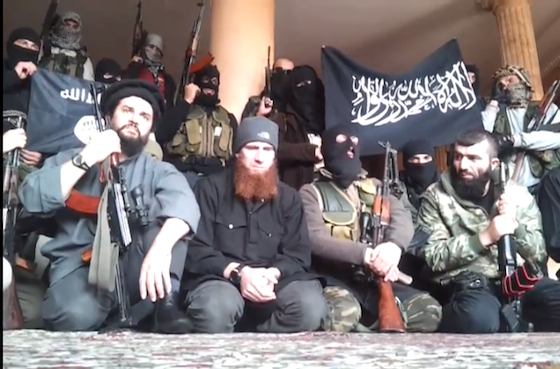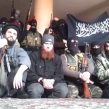
Caucasus Emirate Reverses Position on Syrian Jihad
Publication: Eurasia Daily Monitor Volume: 10 Issue: 123
By:

In less than a year, the Caucasus Emirate’s leaders have reversed their position on whether or not to view the uprising in Syria as a sacred jihad. The leader of the North Caucasian jihadist movement, Doku Umarov, spoke rather ambiguously in a video address last November about the North Caucasians who are fighting in Syria (https://nohchipress.info/2012/11/6995). Umarov failed to conceal his disappointment with some of his fellow militants who ignored the North Caucasian rebel leadership and went to Syria. He said that he supported those who want to install sharia law in Syria, but he rebuked those from the North Caucasus who went there, thereby undermining the jihad in the North Caucasus. Thus the Caucasus Emirate leader reprimanded in particular those under his command who left for Syria and thereby rejected his authority. Moreover, Umarov emphasized that “the jihad in the Caucasus is more brutal and intense than on Syria’s territory.” The Caucasus Emirate leadership was, therefore, unequivocally against its fighters swapping the jihad in the North Caucasus for the jihad in Syria.
At the start of 2013, a well-known Muslim scholar from the North Caucasus, Sheikh Abu Abdurrakhman al-Magribiy, issued a fatwa in support of the position of the Caucasus Emirate leadership. Responding to a question about the participation of North Caucasians in the Syrian conflict, he stated that they should strive primarily to wage war at home, not in Syria (www.kavkazcenter.com/russ/content/2013/01/01/95284.shtml). At the same time, the sheikh pointed out in his fatwa that North Caucasians could justifiably participate in the war in Syria if their aim was to acquire combat experience and then return home and use it there. So the militants’ religious authority proposed something Russia is very afraid of—namely, hardened militants returning to the North Caucasus to damage Russian interests. Indeed, Russian analysts have expressed concern about that risk (https://kavpolit.com/vojna-v-sirii-rasshatyvaet-kavkaz/?print).
Over time, however, the rebels’ attitude toward war in Syria has evolved. So far, the vast majority of the ethnic Chechens and other North Caucasians who are fighting against the government of President Bashar al-Assad arrived there not from the Caucasus, but from countries where they were studying or had refugee status—for example, Rustam Gelaev, who was among the first reported Chechens killed in Syria (www.newsru.com/world/22aug2012/gelaev.html). Gelaev was student at a university in Cairo. Another Chechen recently killed in Syria, Murad Muzaev, was a refugee in Sweden (https://nohchipress.info/2013/05/7867).
Meanwhile, the North Caucasian volunteers in Syria have become so active and efficient that their militarized units have been merged into the unified system of the Syrian armed opposition forces. In March, several brigades of Syrian mujahideen, such as the Hattab and Jaish Muhammad brigades, merged with the Muhajireen Brigade (Brigade of Muhajirs) under the command of Emir Umar Shishani. The group was subsequently reorganized into the Jaish al-Muhajireen wal-Ansar (Army of Emigrants and Helpers) (www.azglobus.net/3298-siriya-boycy-imarat-kavkaza-prinyali-prisyagu-video.html). Dozens of videos showing North Caucasian military actions in Syria have been posted on YouTube. A majority of the militants are apparently ethnic Chechens, and the videos are easy to find on YouTube using the search term in Russian “Chechens in Syria.”
Given the growing prominence of the North Caucasians taking part in the Syrian civil war, the Caucasus Emirate leadership was forced to review its attitude toward them. By now all the websites affiliated with the Caucasus Emirate proudly report on how the North Caucasians are fighting in Syria. Moreover, Emir Salauddin, a North Caucasian, has been appointed as the official representative of the Caucasus Emirate in Syria (at www.dailymotion.com using the search term in Russian “The Address by Salauddin, Emir of the Caucasus Emirate in Syria, to Muslims”). So the leaders of the Caucasus Emirate are trying to establish control over their countrymen who are fighting in Syria in order to compel them to return to Chechnya later. If the Caucasus Emirate does not establish control over the North Caucasian fighters in Syria, they could become an alternative force in the North Caucasus upon their return. The willingness of Chechens from the Middle East and Europe to take part in the Syrian war is not based on religion alone, but also on the anti-Russian background of the conflict—after all, Assad’s regime, against whom the Syrian opposition is fighting, enjoys the backing of Moscow (https://ummanews.com/news/last-news/10703-2013-06-15-09-48-07.html). This is an important consideration for many North Caucasians.
There could have been no more painful blow to Russian propaganda than the Muslim theological conference that took place in Cairo on June 13, which recognized war in Syria as a jihad. The issue was not so much about the conference itself, since similar conferences take place in the Middle East quite often, but about its participants. The organizers of the conference in Cairo included everyone who took part in a similar conference in Moscow in May 2012 (www.1tv.ru/news/social/208049). Also among the Cairo conference participants was Sheikh Yusuf Kardavi, whom Moscow for years has tried to persuade to condemn North Caucasian jihadism. All the participants at the Cairo conference unanimously supported the view that what is happening in Syria is a real jihad and all Muslims should provide assistance to the Syrian people in their struggle against Assad (https://nohchipress.info/2013/06/8048).
The conflict in Syria has provided the North Caucasians with unexpected allies—the Pakistani Taliban (Tehrik-i-Taliban Pakistan), which has declared a jihad against Russia (https://as-ansar.com/vb/showthread.php?t=91236). The declaration in itself may not mean much, but it indicates that Russia’s actions in Syria and the participation of Chechen volunteers in that war boost the level of international importance of the situation in the North Caucasus. Many analysts have stated that the jihadists of the North Caucasus are part of the global jihadist movement, and the Chechens are now taking actual steps in that direction. Having been rejected by all potential allies, the jihadists of the North Caucasus were long isolated from the rest of the world. The presence of some individuals from the Middle East among the insurgents in the North Caucasus was seen as a much desired link to the outside world. Only the war in Syria has made it plausible for the North Caucasians to truly break their isolation.
Clearly the Syrian civil war provides an impetus for changes not only in the Middle East, but for many other parts of the world as well. The consequences of the Syrian conflict will end up being more significant than all the Arab revolutions in the countries of North Africa put together. Chechnya and the North Caucasus can hardly avoid being drawn into this turbulence.




